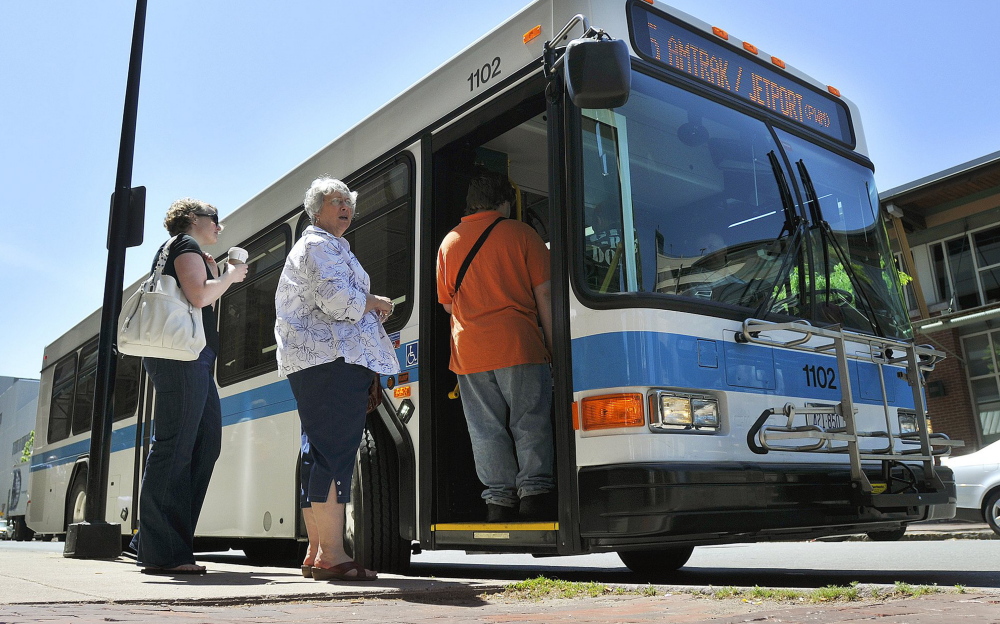When will that ferry get here? Have I already missed my bus?
Passengers of Casco Bay Lines ferries and the region’s two bus systems will soon know the answer to those questions just by glancing at their smartphones.
The ferry line is working with Metro/Greater Portland Transit District and the South Portland Bus Service to implement a new GPS tracking system. The three agencies partnered to award a single contract to one company to provide the service to all of them.
Clever Devices Ltd. of Woodbury, New York, which won the bid, is providing GPS equipment, software and a website where passengers will be able to view a map showing when the next bus or ferry will arrive at various stops.
In addition, the agencies will make their data and open-source codes available for free to developers, who they expect will create apps for smartphones and other computer devices.
The system should be operational by late summer or early fall.
Casco Bay Lines will be the first ferry company in the nation to offer the service, said General Manager Hank Berg. He said it will be especially useful for the “down the bay” ferry run, which is unpredictable because it carries freight as well as passengers.
“In the middle of winter, someone can see if their boat is running late and not have to go out on the dock in a blizzard and wait for the boat so long,” Berg said.
Casco Bay Lines is paying $69,000 to start the service. Metro, which is preparing to provide bus transportation to the city’s high school students this September, is spending about $500,000. The Federal Transit Administration is covering 80 percent of the cost.
Metro General Manager Gregory Jordan said people are much more likely to use the bus for transportation if they know the true arrival time.
“This is a game changer,” he said. “In transit, it’s all about certainty and having faith the bus is coming. You will be able to see in real time that it’s coming to your stop.”
At high-volume stops, the agency will install electronic messaging signs to provide the same data, he said.
The South Portland service will launch its system around the same time. South Portland will pay $100,000 for its share of the contract.
Managers of Metro, Maine’s largest bus system, will be rolling out several other changes in August, including improved Sunday service, adding more bus shelters and making route changes that will bring buses down Congress Street every 15 minutes during peak times.
Route 3 and Route 6 will be combined into one bidirectional loop. The result will increase the frequency of service on Congress Street between Washington Avenue and St. John Street, Jordan said.
The agency will expand its Sunday service, which is now minimal, so that buses operate on all routes. It also will improve service on four holidays: Veterans Day, Patriots Day, Presidents Day and Columbus Day.
This year, Metro also plans to install 30 new bus shelters throughout its service area, which includes Portland, Falmouth, Westbrook and the Maine Mall area in South Portland.
The agency had planned to add a new express service between Portland, Falmouth, Yarmouth and Freeport this summer. However, it decided to delay the service until next spring because it wants to purchase three buses that are more specialized than originally planned.
Metro had planned to buy standard light-duty buses, but now wants to purchase medium-duty “low floor” buses that have only a single step and are much easier for people with disabilities to use. Jordan said it takes longer for manufacturers to deliver those specialized buses.
Metro will hold public meetings this week and next to gather views from passengers about how to improve the service.
The meetings start at 5:30 p.m. Monday at Merrill Memorial Library in Yarmouth; 5:30 p.m. Tuesday at Walker Memorial Library in Westbrook; and 6 p.m. Wednesday, May 27, at OceanView at Falmouth. Metro held a meeting in Portland on Saturday.
Send questions/comments to the editors.



Comments are no longer available on this story